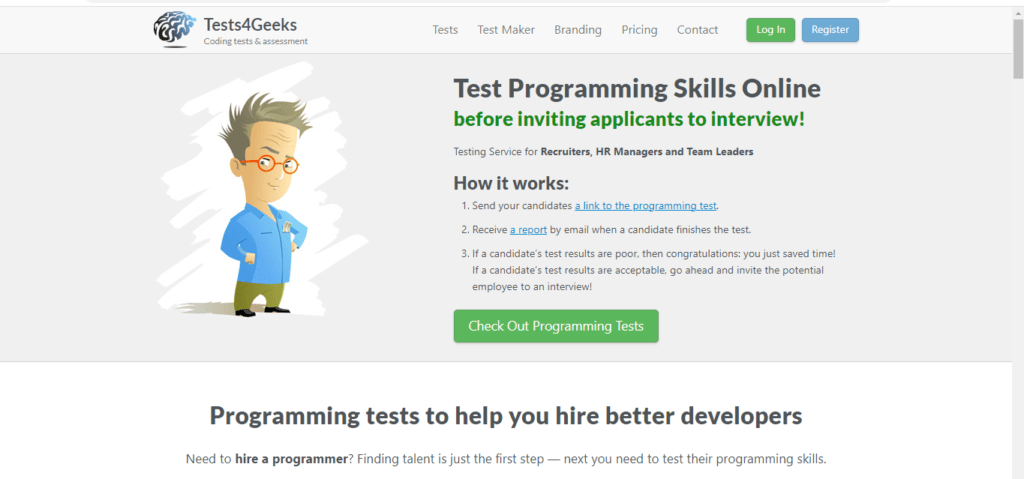
Navigating the Data Deluge: Power BI for Healthcare & Pharma
Navigating the Data Deluge: How Power BI Empowers US Healthcare & Pharma
A Comprehensive Guide to Hiring Developers for Your Startup
Hiring developers for your startup doesn’t have to be a daunting task – dive into this blog for added assistance, reduced mistakes, and improved time management.
Given the technical developments in the world, a large number of IT startups have emerged in the market. The initial stages of building a startup require a heavy workload, which can become stressful to manage single-handedly. Hence, hiring a developer for a startup improves time management, encourages work flexibility, minimizes error, and provides quality assistance and a fresh perspective.
However, you might face certain challenges while recruiting developers. Some of these include:
If you have a startup and want a practical, step-by-step guide for hiring developers, read on!
To kick-start your startup, identify your tech stack requirements. This stack includes the programming languages and software tools needed to create your product, serving as the foundation for your digital solution. It is the foundation of a digital solution. There are seven factors to consider while choosing a startup tech stack.
Balancing short-term success with long-term vision is the key to a thriving startup. You should ensure that your short-term goals are attainable and time-bound, while your long-term vision should focus on sustainability and adaptation.
Hence, while hiring a developer, it is essential to craft a clear job description and role expectations. Explain the key responsibilities, nature of work (office/remote), technical and soft skill requirements, and any additional benefits. Also, briefly describe your startup, its vision, and its products.
As the recruitment process becomes more competitive, almost every company seeks the best developers. The following ways can help you source developer candidates:
Your recruitment process reflects your company, and hence, it adds to your reputation in the industry. Some efficient and beneficial steps for shortlisting candidates include:
Structuring the interview process: The interview for assessing and hiring a developer can be divided into three parts – technical, behavioral, and cultural. A few sample questions include:
1. Technical Questions:
2. Behavioural Questions:
3. Cultural Questions:

Source: Tests4Geeks
Doing a reference check helps you to rely on the information given by the potential hire. To carry it out, ask your candidates to provide you with the contact information of their former employers. Besides, doing a background check reduces liability, safeguards assets, and ensures quality candidates.
Some legal challenges, such as taxation, ownership of the product, and dispute resolution mechanisms, should be considered before hiring a developer. Verifying the authenticity of the candidate’s degrees and certificates ensures safe hiring.
Before hiring a developer, it is essential to assess the range of soft skills the candidate has. This includes communication abilities, empathy during group work, perseverance, openness to changes, adaptation skills, and creative and critical thinking.

Source: Test Gorilla
Cultural fit, on the other hand, represents the alignment between the startup’s culture and values and the candidate’s beliefs, values, and behavior. Assessment of a candidate’s cultural fit can be done by:
While making a job offer, it is essential to include the job title, salary, benefits, and start date. Negotiating the salary amount is equally important. Maintaining a fair salary within budgetary restrictions can be challenging. Hence, being aware of the industry standards, setting a range, and expecting counters can help negotiate. Moreover, certain employee benefits like technology stipends, health benefits, or educational assistance can attract and retain quality developers.
Create a customized and compelling job offer that caters to the role’s requirements and responsibilities, as well as the candidate’s interests and qualifications. If the candidate makes a counteroffer, maintain a professional and positive tone, and let them know your decision.
Onboarding and Integration are processes that help the new employee be immersed in the company’s culture and vision. They also socialize the candidate to their new job role and provide them with resources to make them successful. Onboarding developers can be done in the following ways:
Provide sufficient training and resources to the new developer to attain maximum productivity in the later stages. Train them to understand software complexity, encourage leadership qualities, and familiarize them with the existing code base. Don’t forget to set specific, measurable, and achievable goals for them to attain.
Developers are precious. Hence, efforts should be put into retaining and developing them. You can do this by:
When hiring a new developer, it is essential to agree on well-structured legal contracts to prevent future mishaps. These mainly include:
Hiring and working with remote and freelance developers has its pros and cons.
Pros include:
Cos include:
To effectively manage remote and freelance developers, consider these steps:
There are plenty of communication tools that make remote team collaboration smooth. Examples include Slack, Google Meet, Miro, Google Drive, Jira, and Confluence.

Source: Slack
So, before you set out to hire a new developer for your startup, consider the above tips and tricks. Make sure to screen, shortlist, interview, and evaluate the candidates. Do a formal check on their background and then make an offer to the right talent! If needed, invest in partnering with tech recruiters for the same. Better safe than sorry!
What strategies have you followed to enhance your developer hiring process? Let us know on Linkedin, Facebook & Twitter!
Some essential qualifications for hiring a developer include knowledge of relevant programming languages, technical skills, creativity, problem-solving skills, and collaboration.
To hire appropriate programmers for a startup, specify your business needs, find necessary candidates, analyze and verify their skills and qualifications, conduct interviews, and start the collaboration post-selection.
The total number of developers depends on the project size. Too many developers with different viewpoints may confuse and hinder the work process. Hence, it is essential to hire developers as per requirement.
Find remote developers who have outstanding communication skills. Use time management, project management, and messaging apps to collaborate.

Navigating the Data Deluge: How Power BI Empowers US Healthcare & Pharma

Beyond the Gradebook: Unleashing Ed-Tech Potential with Power BI Table of Contents

From Data Overload to Decisive Action: Power BI in Banking/ Finance Table